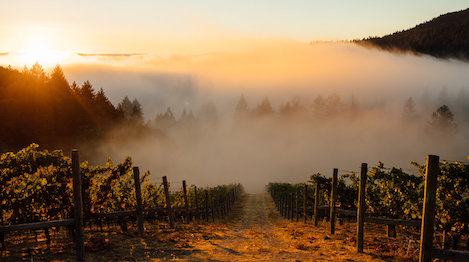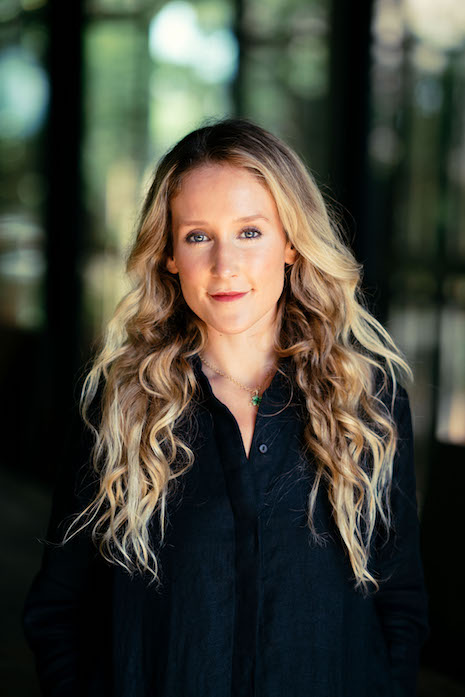 Rudd Oakville Winery embraces its family history. Image credit: Rudd Oakville Winery
Rudd Oakville Winery embraces its family history. Image credit: Rudd Oakville Winery As luxury becomes closer to a wider audience of consumers with a broader range in income, wine has become more accessible as well, as its popularity grows.
Rudd Oakville Estate is a family winery in California that is embracing the notion that wine is no longer intimidating. The winery focuses on creating a range of quality products that can appeal to the wine experts as well as novices, while embracing its heritage and location.
“Personally, I think the days of exclusion are over,” said Samantha Rudd, head of Rudd Oakville Estate, Napa Valley. “Wine can’t be an intimidating topic anymore. We need to be open and welcoming to all consumers no matter their level of wine knowledge.”
In this Q&A, Ms. Rudd discusses trends in the wine industry, the future of her family’s business and how the land and history of the product is integral to its efforts.
What are some current trends in the high-end wine industry?
Wine is much more than what is in the glass – it is also about the person drinking it, and their memories and life experiences.
For instance, social media has for many years been taboo, communicating that a winery is “too accessible,” which is one of the reasons we recently started an Instagram account. We’re proud of what we do here and want to share it.
Please tell me a little bit about Rudd Oakville Estate:
Rudd Oakville Estate was founded in 1996 by my father, Leslie Rudd. Rudd Oakville Estate remains one of the few true family-owned estates in the Napa Valley.
He was inspired by French winemaking, and he set out to build a multigenerational estate to craft wines that reflect the ultimate expression of our world-class terroir, wine that respected the traditions of the past, challenged the present and imagined future possibilities.
Our philosophy and practices are inspired by makers and craftspeople committed to the centuries-long winemaking history, with an emphasis on commitment to the land and quality in winegrowing and making.
How does the land tie into consumer-facing business for wine brands?
The land is the foundation. Truly great wines are only created by combining the uniqueness of terroir with a team of people that are fully committed to being good stewards of the estate and in turn the wines.
This deeper connection to the land we all feel here at Rudd can truly be felt when our customers visit us in Oakville.
Based on the philosophy that wines reflect their birthplace, we consider ourselves “winegrowers” rather than “winemakers.” What we do is fundamentally an agricultural endeavor, with the decisions that most affect the final product often made in the field.
What are some new offerings in Rudd Oakville?
In early 2019, we will relaunch Crossroads, Rudd’s companion wine. Crossroads will appeal to nascent wine enthusiasts and to Rudd devotees, and will serve as a high-quality wine that can be served any night of the week.
How important is heritage when it comes to wine brands?
It’s at the core of great winemaking. The longer you work the land, the more you understand it.
The land planted by my father, we’re just now beginning to fully understand it. Personalized historical knowledge of our land is our most valuable asset.
How does Rudd Oakville include heritage into its business?
Heritage is in our DNA. We have built tradition into every step of the process, from the world-class terroir in which we grow our grapes to the concrete in our wine tanks, which is made using rocks from our own vineyard.
When my father founded Rudd Oakville Estate, his driving mission was to create a true multigenerational, family-owned estate, with each generation improving on the last.
He built the estate with this legacy in mind after visiting Château Haut-Brion as a young man. The reverence and responsibility the owners — who happened to be American — felt for the heritage and stewardship of their unique piece of land was palpable.
It was his first exposure to a business paradigm driven by a multigenerational legacy of craftsmanship, artistry and excellence rather than by pure economic return.
I first came to this property when I was 8 years old, and immediately felt connected to the land. I wanted to build upon what my father had started — I trained at Spottswoode and Château Margaux, two female-owned and run estates – to learn about the craft of winemaking at estates that have been passed from generation to generation for decades.
How does location of the vineyard come into play with the winemaking business?
Oakville, where we are located in the Napa Valley, is recognized as one of the greatest wine appellations in the world.
The climate in Oakville is particularly conducive to winemaking and we are in good company. Oakville is home to the most prestigious wines in America. Our particular piece of land benefits from this microclimate combined with the unique deposits of rock, soils and minerals left in small layers, fans and ribbons by volcanic activity that occurred millions of years ago.
What does the future hold for Rudd?
In addition to launching Crossroads, we’re excited to kick off Unlikely Collaborators, a program in which Rudd is granting residency to experts in their specific field, who will use the property as a source of inspiration for their work.
We have already hosted Dustin Yellin and will be hosting sculptor Maria Meyer in November.
We’ve been farming organically for years and have integrated biodynamic farming practices on the property as well, which will help me to fulfill my generational promise to my father ensuring that the land will be in better condition when I leave it to my children.
